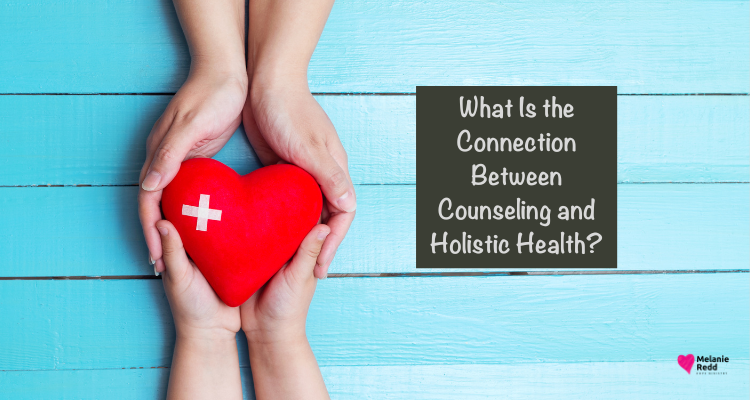What Is the Connection Between Counseling and Holistic Health?

What Is the Connection Between Counseling and Holistic Health?
Holistic health is a comprehensive approach that emphasizes the interconnectedness of the physical, emotional, mental, and spiritual aspects of an individual’s well-being. Unlike traditional medicine, which often focuses on treating physical ailments, holistic health promotes balance and harmony across all areas of life.
In like manner, counseling, a practice traditionally associated with mental health, plays a major role in this integrated approach. It offers tools and strategies to address emotional and mental challenges, supporting the overall health paradigm. In this blog, we will share how counseling is an essential component of holistic health and how it contributes to overall well-being.
The Fundamentals of Holistic Health
Holistic health is based on the premise that everyone is an integrated whole. If one part of the body or mind is out of balance, it can affect the entire system. This approach focuses not just on eradicating diseases but on creating a state of complete physical, mental, emotional, and spiritual wellness.
Also, it involves actively pursuing this balance and health, requiring a more proactive approach to well-being than traditional healthcare models. Counseling enters this sphere by addressing mental and emotional health, ensuring that these foundational aspects are not overlooked but are actively managed and nurtured.
Role of Counseling in Holistic Health
Counseling serves as a bridge between various aspects of health, making it a pivotal element of holistic wellness. It helps individuals navigate through life’s challenges, offering support in developing emotional and mental resilience. Even more, addressing these components is vital for anyone seeking holistic health, as unresolved emotional issues can lead to physical symptoms and illnesses. Counselors provide valuable guidance on how to integrate healthier mental habits, reinforcing the connection between psychological well-being and overall health.
For those looking to deepen their understanding and practice in this area, pursuing a counseling degree can be a valuable step. Such programs make the field more accessible, allowing more practitioners to integrate counseling into holistic health practices. An even more flexible option is an online degree, which caters to individuals who may not have the ability to attend traditional on-campus programs. It offers the convenience of learning at one’s own pace and schedule. Furthermore, affordability need not be a concern. With just a few clicks, prospective students can easily find the cheapest online counseling degree that offers a robust curriculum.
Benefits of Integrating Counseling with Traditional Health Practices
The integration of counseling and traditional health practices leads to a more robust healthcare approach. For instance, patients dealing with chronic diseases such as diabetes or heart conditions often find their physical symptoms exacerbated by stress, anxiety, or depression. When counseling is used in conjunction with medical treatment, patients frequently report better management of their conditions, improved adherence to medical advice, and overall enhanced quality of life. This synergy not only helps in treating the disease but also in managing the emotional and psychological strife that often accompanies chronic illness.
Types of Counseling Approaches
Several counseling approaches contribute effectively to holistic health. Cognitive-behavioral therapy (CBT), for instance, helps individuals develop coping strategies that alter negative thoughts and behaviors, which can improve their physical health. Psychoanalytic therapy delves deeper into emotional experiences and unresolved conflicts, fostering healing and wholeness. Choosing the right type of counseling can depend on the individual’s specific needs and the particular challenges they are facing, making the counselor’s role critical in guiding their clients toward the best-suited techniques for their holistic health journey.
Counseling for Stress Management
Stress is a common factor that disrupts holistic health, affecting emotional stability and physical health. Counseling plays a significant role in managing stress by providing tools to understand and mitigate its impacts. Techniques such as mindfulness, stress reduction strategies, and therapeutic practices are commonly used in counseling sessions to help individuals learn how to manage their stress effectively. This not only improves their mental health but also contributes to better physical health outcomes, as chronic stress is a known risk factor for numerous physical conditions.
Emotional Resilience Through Counseling
Emotional resilience refers to the ability to adapt to stressful situations or crises with flexibility and bounce back from them. In the realm of holistic health, building emotional resilience is important because it helps individuals handle life's inevitable ups and downs more effectively. Counseling aids in this development by providing a safe space for individuals to explore their feelings, understand their emotional triggers, and learn coping mechanisms. This process not only strengthens mental health but also supports physical health by reducing the body’s stress responses, which can exacerbate or lead to physical ailments.
Counseling and Lifestyle Changes
Lifestyle changes are often recommended as part of treatment plans for various health issues, from weight management to heart disease prevention. Counselors can play a significant role in helping individuals make these changes sustainably. They work to understand the psychological factors that might prevent someone from following through with diet, exercise, sleep, and other lifestyle recommendations. Through counseling, individuals can set realistic goals, explore their motivations, and overcome barriers to maintaining these healthier habits, crucial for long-term wellness.
Holistic Health for Different Life Stages
Different life stages present unique health challenges and needs. Counseling adapts to these changing requirements by offering tailored approaches that reflect an individual’s developmental stage. For children and teenagers, it might focus on issues like self-esteem and peer relationships, while counseling for adults might center on stress management or work-life balance. For seniors, counseling could help them manage the transition into retirement and cope with age-related changes. Recognizing and addressing the specific emotional and mental health needs at each stage ensures that holistic health remains a priority throughout one’s life.
Overcoming Barriers to Holistic Health with Counseling
Several barriers can hinder an individual’s pursuit of holistic health, such as stigma surrounding mental health, financial constraints, and a lack of resources. Counseling helps break down these barriers by providing education, support, and advocacy. Counselors can guide individuals to available resources, help them build supportive networks, and work through internalized stigmas related to seeking help. Effective counseling aims to make holistic health accessible and achievable for everyone, regardless of their starting point.
Conclusion
Throughout this exploration of the connection between counseling and holistic health, it’s clear that emotional and mental wellness are not just parts of overall health but are foundational to it. Counseling does more than just treat mental ailments; it actively contributes to and improves an individual’s comprehensive well-being. By integrating counseling into holistic health practices, individuals can achieve greater balance and health across all aspects of their lives. This integrated approach not only addresses immediate health concerns but also fosters long-term resilience and wellness, affirming the indispensable role of counseling in achieving true holistic health.
Were you encouraged by what you read?
Then, would you share this article with a friend, co-worker, or family member?
Or, maybe you can send it to a friend or family member?
This blog occasionally uses affiliate links and may contain affiliate links.
Additionally, Melanie Redd is a participant in the Amazon Services LLC Associates Program.
This is an affiliate advertising program designed to provide a means for sites to earn advertising fees. These are earned by advertising and linking to amazon.com.
Also, for more on my disclosure policy, click HERE.
© Melanie Redd and Hope Ministry, 2024. Unauthorized use and/or duplication of this material without express and written permission from this blog’s author and/or owner is strictly prohibited.
Further, excerpts and links may be used, provided that full and clear credit is given to Melanie Redd and Hope Ministry.
Please give appropriate and specific directions to the original content.



0 Comments